You step outside, only to find your once-pristine yard peppered with holes. Frustrating, isn’t it? For many dog owners, digging can seem like a destructive or puzzling habit, but in reality, it’s a behavior deeply rooted in a dog’s natural instincts. Whether your furry friend is searching for comfort, trying to uncover hidden treasures, or simply burning off excess energy, digging serves a purpose—even if it drives you crazy.
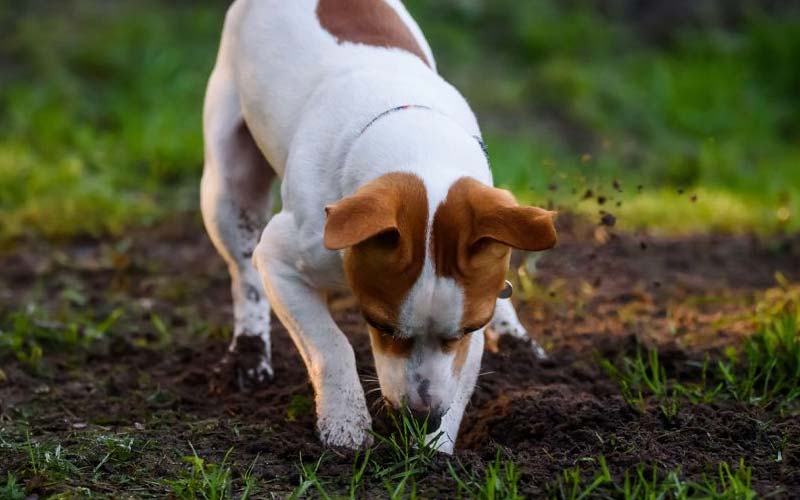
Understanding why dogs dig is the first step toward managing this behavior effectively. In this article, we’ll explore the most common reasons behind your dog’s digging habits and provide actionable solutions to stop or redirect this behavior. By the end, you’ll have a clear understanding of your dog’s needs and how to protect both your pet’s happiness and your yard’s condition.
1. The Natural Instinct: Why Digging Is Normal for Dogs
Digging is a completely natural behavior for dogs, rooted in their instincts and ancestry. While it may seem like a nuisance to pet owners, this behavior serves specific purposes, especially for certain breeds that are hardwired to dig.
Breeds like terriers, dachshunds, and scent hounds are well-known for their digging tendencies. Terriers, for instance, were historically bred to hunt small animals that burrow underground, like rodents and rabbits. Similarly, dachshunds were developed to chase badgers into their dens, making digging an essential skill. For these dogs, digging isn’t just a random activity—it’s part of their genetic makeup.
Historically, dogs dug holes for several reasons: to hunt for prey, hide food to protect it from scavengers, or create a safe, cool shelter during extreme weather. Even today, these instincts remain strong, and modern dogs may still dig for comfort, entertainment, or survival, depending on their environment.
The key takeaway for dog owners is to understand that digging is not necessarily “bad behavior.” Instead, it’s a natural, instinct-driven activity. Recognizing this helps pet parents approach the issue with patience, knowing that managing digging often involves working with their dog’s instincts rather than punishing them for it.
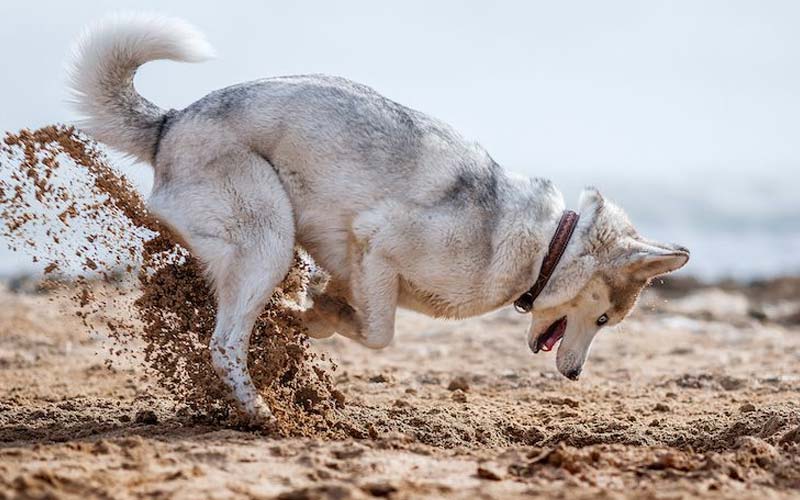
2. Top Reasons Why Dogs Dig Holes
Dogs dig holes for a variety of reasons, many of which are tied to their natural instincts or specific needs. Below are the most common explanations for this behavior:
1. Boredom and Lack of Stimulation
Dogs are active and curious animals, and when they don’t get enough physical or mental stimulation, they may resort to digging as a way to entertain themselves. If a dog is left alone in the yard with little to do, digging becomes a fun and self-rewarding activity to pass the time.
2. Seeking Comfort
In hot weather, dogs often dig to find cooler ground beneath the surface. The soil under the grass is naturally cooler and provides relief from the heat. Conversely, some dogs dig to create a sheltered, cozy spot where they feel safe and comfortable, mimicking a den-like environment.
3. Hunting for Prey
A strong prey drive can lead dogs, especially breeds like terriers and hounds, to dig holes in pursuit of small animals such as moles, insects, or rodents. Even the scent or sound of underground creatures can trigger a dog’s instinct to chase and uncover its target.
4. Hiding Valuables
Dogs have an instinctual tendency to bury food, bones, or toys as a way to protect their “treasures” from being taken. This behavior stems from their ancestral survival instincts when resources were scarce, and hiding food ensured they could return to it later.
5. Anxiety or Stress
Digging can be a coping mechanism for dogs experiencing stress, anxiety, or frustration. Dogs with separation anxiety, for example, may dig as a way to release pent-up energy or distract themselves from feeling alone.
6. Escaping or Exploring
Some dogs dig near fences or gates to escape the yard in search of adventure, companionship, or out of curiosity. This is particularly common for dogs that are left unsupervised for long periods or are drawn to something outside their territory.
Understanding the root cause of your dog’s digging is essential to addressing the behavior effectively. By identifying why your dog digs, you can take targeted steps to manage and redirect this instinct in a positive way.
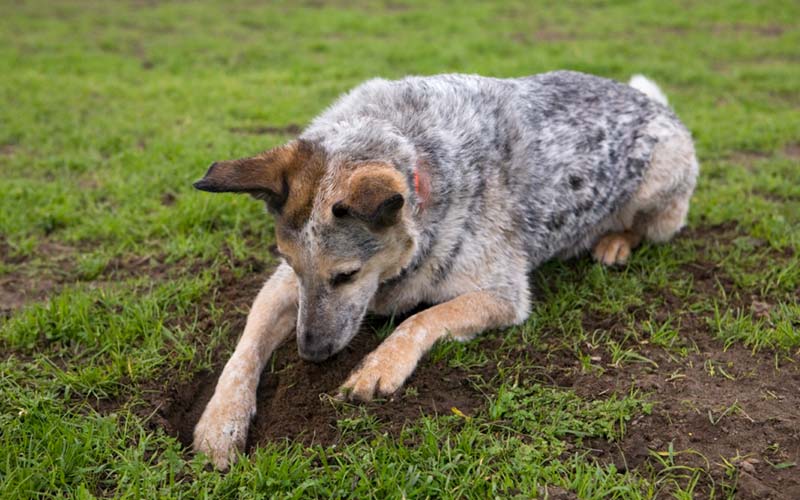
3. When Digging Becomes a Problem
While digging is a natural behavior for dogs, excessive or compulsive digging can signal an underlying problem. If your dog suddenly begins digging more than usual or does so obsessively, it may be a sign of stress, anxiety, or boredom. For example, dogs experiencing separation anxiety may dig as a coping mechanism, while others might use digging to release pent-up energy due to a lack of exercise or mental stimulation.
Signs to watch for include a sudden increase in digging, visible signs of stress (like pacing, whining, or destructive behavior), or injuries caused by digging, such as damaged nails or paw pads. These can indicate that the behavior is no longer just instinctual but a sign of discomfort or distress.
If your dog’s digging becomes persistent or unexplained, it’s important to consult a veterinarian or professional dog behaviorist. They can help identify any physical or emotional issues and provide guidance on managing and redirecting the behavior effectively.
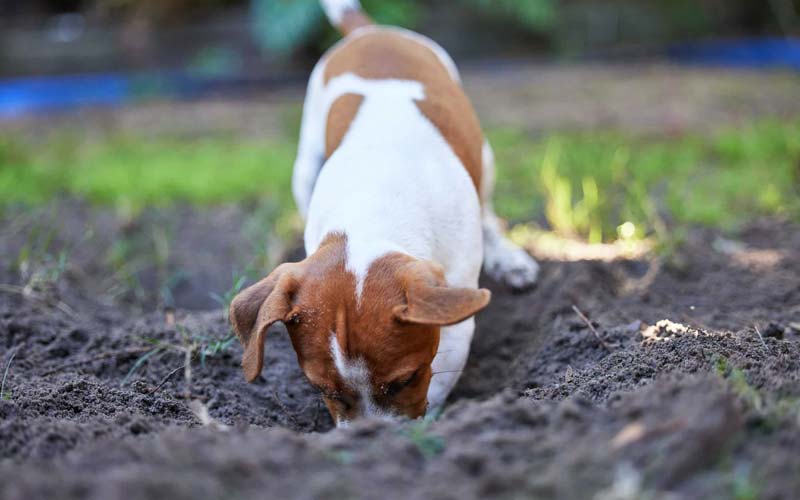
4. How to Stop or Manage Your Dog’s Digging
Managing your dog’s digging behavior involves a mix of providing outlets for their natural instincts and addressing any underlying causes. Below are practical and effective solutions to help reduce or eliminate digging:
1. Provide Mental and Physical Stimulation
A well-exercised dog is less likely to dig out of boredom or excess energy.
- Increase exercise: Daily walks, runs, and play sessions help burn off physical energy, reducing the need for destructive behaviors.
- Interactive games: Engage your dog in fetch, tug-of-war, or agility training to keep them active and mentally stimulated.
- Mental stimulation: Use puzzle toys, treat-dispensing toys, or obedience training to challenge your dog’s mind and prevent them from becoming bored. Introducing new activities or learning experiences can also keep their attention focused.
2. Designate a Digging Zone
If your dog has a strong instinct to dig, provide them with an outlet for this behavior.
- Create a sandbox or digging area: Set up a designated space in your yard where your dog can dig freely. Fill it with soft soil or sand to encourage digging in that specific area.
- Positive reinforcement: Whenever your dog digs in the designated area, reward them with praise or treats. This will help them learn where it’s acceptable to dig and encourage them to avoid other parts of the yard.
3. Reduce Anxiety and Stress
Digging is often a response to stress or anxiety.
- Address separation anxiety: Provide comfort items such as your clothing or a favorite blanket to soothe your dog when you’re away. Consistent routines and short departures can help reduce anxiety over time.
- Calming techniques: Use calming pheromone diffusers, anxiety wraps, or soothing music to create a more relaxed environment.
4. Block Escape Routes
If your dog is digging to escape, take steps to make your yard more secure.
- Reinforce fences: Ensure there are no gaps or weak spots that your dog can exploit. You may need to dig a few inches into the ground at the base of the fence to prevent tunneling.
- Remove triggers: If your dog digs to chase animals outside the yard, consider blocking their view of the street or other distractions.
5. Improve Their Environment
Dogs often dig for comfort, so ensure your yard provides the right conditions.
- Provide shade and cool resting spots: On hot days, dogs dig to find cooler ground. Make sure they have shaded areas or a cool place to rest.
- Access to fresh water: Always provide fresh, clean water, especially during warm weather, to help prevent digging due to thirst.
By providing mental stimulation, creating a designated digging zone, reducing anxiety, reinforcing your yard, and improving their environment, you can effectively manage your dog’s digging behavior and help them feel more content and secure.
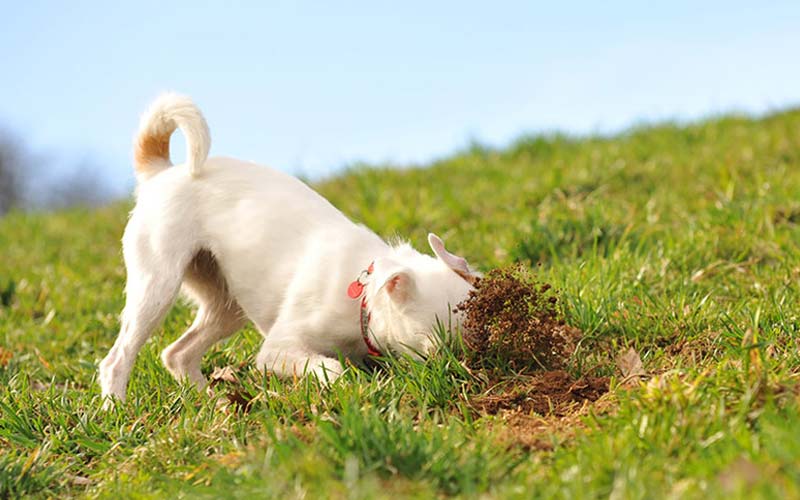
5. Breeds That Are Prone to Digging
Certain dog breeds are more prone to digging due to their history and natural instincts. These breeds often have a strong prey drive or were bred for tasks that required digging, making them more likely to dig as part of their daily behavior.
- Terriers (e.g., Jack Russell Terrier, Cairn Terrier): These breeds were originally bred to hunt small burrowing animals, making them natural diggers.
- Dachshunds: Known for chasing badgers and other burrowing creatures, Dachshunds often dig to search for prey.
- Siberian Huskies: Huskies are energetic and enjoy digging to stay cool or entertain themselves.
- Beagles and other scent hounds: Their keen sense of smell drives them to dig in search of hidden scents or small animals underground.
Owners of these breeds should manage expectations, as digging is a natural behavior. Providing adequate mental and physical stimulation, creating a designated digging area, and ensuring a secure environment will help manage their instincts while reducing unwanted digging.
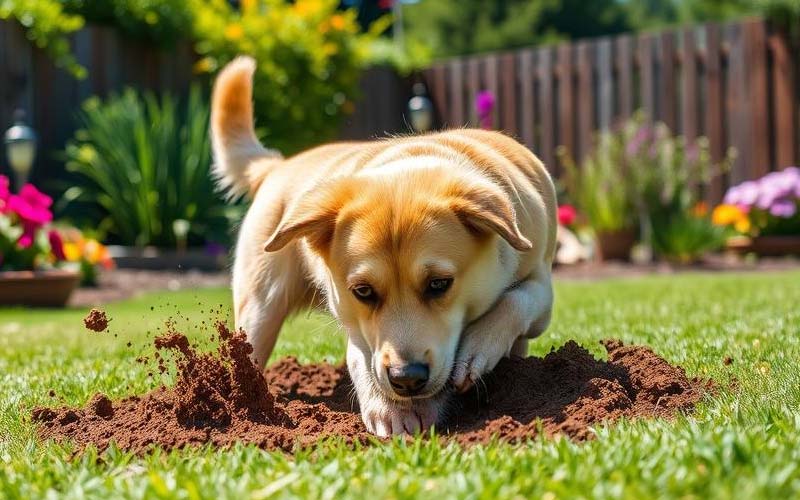
Conclusion: Managing Your Dog’s Digging Behavior
Digging is a natural behavior that can stem from a variety of reasons, including boredom, anxiety, or instinctual drives. While it can be frustrating, understanding why your dog digs and providing appropriate outlets can help minimize the behavior. Whether it’s increasing physical and mental stimulation, designating a digging zone, or addressing anxiety, there are many ways to manage and redirect your dog’s digging habits in a healthy, positive manner.
If you own a breed predisposed to digging, such as terriers or hounds, it’s important to acknowledge that this behavior is part of their instincts. Managing expectations and creating an environment that accommodates their needs is key to preventing excessive digging.
By using the strategies outlined in this article, you can help your dog feel more content and reduce the damage done to your yard. If digging becomes excessive or compulsive, consider consulting a vet or behaviorist to address any underlying issues. Your dog’s happiness and well-being are worth the effort, so take action today to create a happier, less dig-prone environment for your pet.